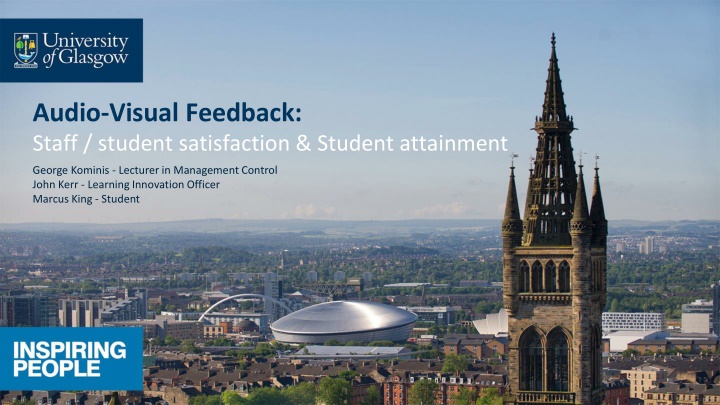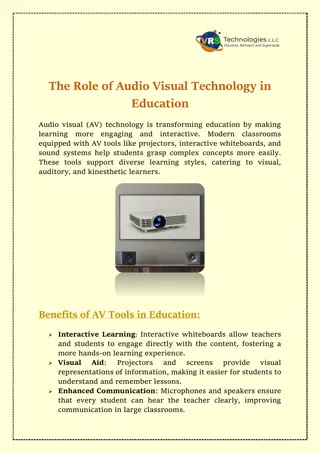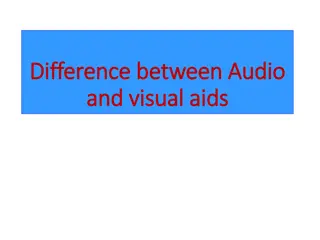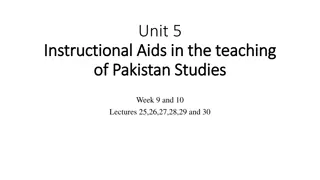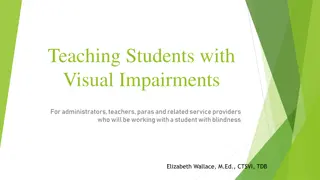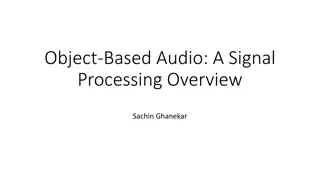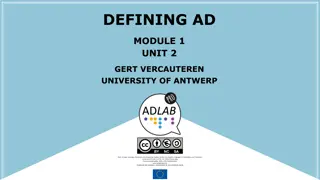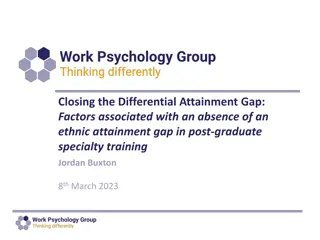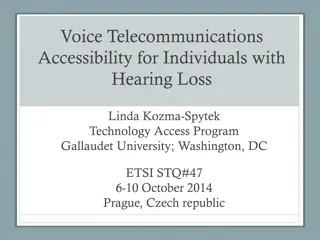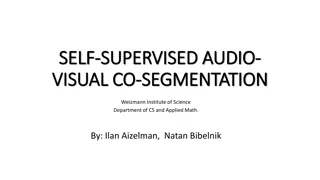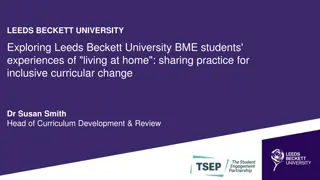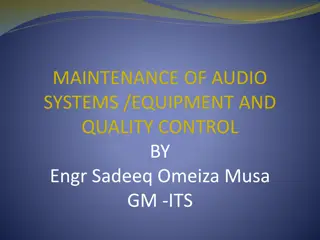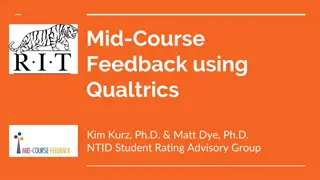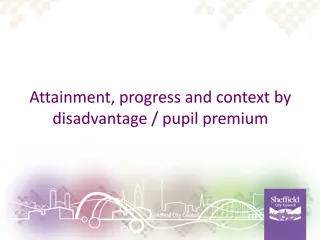Enhancing Feedback Practices with Audio-Visual Technology: A Study on Student Satisfaction and Attainment
This presentation delves into the implementation of Audio-Visual Feedback (AVF) technology to improve assessment feedback practices in an educational institution. The study explores the impact of AVF on student satisfaction levels compared to traditional written feedback, as well as its influence on student attainment. Additionally, it examines staff perceptions of AVF implementation and the benefits and drawbacks they have identified. Results indicate a mixed response with some surprising findings. Student satisfaction with AVF is highlighted, demonstrating a positive reception of this innovative feedback approach.
Download Presentation

Please find below an Image/Link to download the presentation.
The content on the website is provided AS IS for your information and personal use only. It may not be sold, licensed, or shared on other websites without obtaining consent from the author.If you encounter any issues during the download, it is possible that the publisher has removed the file from their server.
You are allowed to download the files provided on this website for personal or commercial use, subject to the condition that they are used lawfully. All files are the property of their respective owners.
The content on the website is provided AS IS for your information and personal use only. It may not be sold, licensed, or shared on other websites without obtaining consent from the author.
E N D
Presentation Transcript
Audio-Visual Feedback: Staff / student satisfaction & Student attainment George Kominis - Lecturer in Management Control John Kerr - Learning Innovation Officer Marcus King - Student
This Presentation describes a case of applying innovative technology for assessment feedback (AVF - Audio-Video Feedback) offers empirical evidence on the effects of AVF on satisfaction & attainment seeks to interpret these findings through a student perspective considers possible implications for institutional changes in approach to feedback
mage result for nss national student survey Business studies 2017 2016 Management studies Change 2017 2016 Change Assessment & Feedback Q11. I have received helpful comments on my work 53.0% 52.0% 52.4% 53.0% 1.0% -0.6% 53.8% 53.0% 51.0% 53.0% 2.8% 0.0%
The Study Our study investigated three key issues: 1. Does AVF increase student satisfaction levels compared to traditional (written) feedback? 2. Does AVF have a stronger (positive) impact on student attainment levels compared to traditional (written) feedback? 3. How is AVF received by staff who choose to implement it? The results are mixed and some are truly surprising!
The Intervention AVF introduced by the Learning Innovation Officer across the College to enhance/transform feedback practices View on increasing NSS scores Over 40 staff trained on this method 10 took part in returning AVF to over 200 students Camtasia used as the main technology to deliver AVF (formative and summative) Files retuned via Moodle Assignment
Teaching staffs perceived benefits from & shortcomings of AVF Benefits from AVF: Focused Shortcomings of AVF: More time consuming Impactful More focused on negatives Specific Detailed Personalised Tone of voice
Student satisfaction across college Students loved AVF! 75% preferred AVF to traditional feedback 96% thought they would act upon their feedback as a result of AVF 96% found it easy to match specific comments to their assignments 70% strongly agreed or agreed that as a result of this method they were spending more time thinking about their feedback.
Students perspective of feedback function What the students say What this means for us Feedback is the biggest aid to my learning. I feel like good feedback is the best tool to learning because it explains how you can improve as well as pointing out key areas that you are good at or have been successful in. Feedback should indicate good students good practice. First of all, it provides an excellent means of making me aware of any gaps in my knowledge. Secondly, it helps to let me know the structure required in the subject. Thirdly, and related, it allows me to know what that particular professor is looking for and what they expect. Feedback should indicate areas for improvement. Feedback often helps me identify flaws in my work so therefore I can improve it when I come to do a similar piece. Feedback should provide guidance on how to improve. Good feedback is a reference for making future improvements. The feedback is provided by professionals who can give insightful and meaningful comments that try to help make the next essay better or guide you better in how to prepare for an exam.
Students perspective on reflecting on & acting upon fback What the students say When researching for and writing a new assignment, I know what to better focus on or how to achieve better understanding of the topic requested from me. It made it clearer what critical thinking is and what an academic standard is for essays and assignments. What this means for us Students can conceptualise areas for improvement and appear to be making judgments of quality regarding their own work. Thanks to the feedback, I have identified the improvements to be made in this specific assessment. I've listened to it a few times I have taken comments into consideration and will make sure not to make the same mistakes in future essays. I used the feedback by writing and down from the video and then to ensure on my next assignment I had for this subject I made changes that were highlighted in my previous essay. Students appear to be critically reflecting on their feedback and using it to improve on future assignments I took notes on areas of improvement and used them to address my next assignment. I also paid attention to the comments on areas where performance was good to make sure I used a similar approach in my next assignment.
Students perceived benefits from & shortcomings of AVF Benefits from AVF: Focused Shortcomings of AVF: Technical issues Impactful Navigation Specific More time consuming Detailed More focused on negatives Personalised Flexibility of use Teacher presence Reflecting of staff effort
Improving AVF - Students perspective Colour coding Written summary Technical accessibility Coordination with the release of the grades Chuncking No replacement for face-to-face meetings
Research Questions (1) Does the provision of feedback affect (positively) students future performance? (2) Does the provision of AV feedback have a stronger effect on students future performance than the provision of traditional (written) feedback?
Research Design (1) Research Setting: a course assessed through 3 equivalent individual written assignments (A1, A2, A3) Method: a between-subjects field experiment; students split into two equivalent, independent groups, specifically formed as to control for two extraneous variables, gender and nationality; with the experimental group receiving AV feedback, the control group receiving traditional (written) feedback; then examining the differences in subsequent performance between the two groups.
Research Design (2) Phase 1 (pre-test phase): the base-line performance for all students was established, as improvement in student performance between the first assignment (A1) and the second assignment (A2) in the course, after students had received feedback of traditional form after the completion of the first assignment (A1). Phase 2 (post-test stage): the experimental group received AV feedback on their second assignment (A2), whereas for the same assignment (A2) the control group received traditional feedback. Student performance in the third assignment (A3) was then measured for both groups (control and experimental) to establish whether there were any significant difference in performance between the two groups receiving different forms of feedback (AV vs. traditional feedback).
RQ1: Impact of Feedback on Student Performance At the descriptive level, students appeared to do slightly better in A2 than in A1; but performance dropped slightly from A2 to A3. When tested for statistical significance through parametric & non-parametric tests, the differences in performance between A1 and A2, and between A2 and A3 are not significant; thereby providing evidence that there was no effect of feedback on students performance. This finding is counterintuitive and contradicts previous evidence that generally feedback, irrespective of its type, improves student performance.
RQ2: Impact of AV Feedback on Student Performance The descriptive analysis reveals that AVF has, surprisingly, a negative effect on subsequent performance; this is in contrast to the traditional (written) feedback, which appears to have a marginally positive effect. 16.1 16 15.9 15.8 Traditional Feedback Subgroup 15.7 15.6 Video Feedback Subgroup 15.5 Parametric and nonparametric tests show, perhaps slightly less surprisingly, that the differences in subsequent performance are not significant, neither for AVF nor for traditional feedback. 15.4 15.3 15.2 Assignment 1 Assignment 2 Assignment 3
In Sum Contrary to our expectations / hypotheses AVF does not appear to have a (positive) effect on students performance, which actually appears slightly reduced in our course, despite students enthusiastic attitudes towards it. But, if this is any consolation, feedback in general (of all forms) does not seem to have a discernible effect on student performance in the setting and sample examined.
Disclaimer The study s findings need to be considered in light of the experiment s limitations: students were not randomly allocated to the two groups; although an attempt was made to control for important extraneous variables (gender and educational background), it is possible that other confounding variables, not controlled in this study, may have affected performance change (e.g. various pressures from other courses or from students extra-curricular activities) alongside feedback type; this threat to internal validity is inherent in quasi-experimental designs, where control over groups is generally limited. On the positive side, our findings are based on data collected from real students in a real (higher education) context, which provides some assurance about the ecological and population validity of the findings.
Thank you! Link to report - http://eprints.gla.ac.uk/119844/ @UofGlasgow /glasgowuniversity Search: University of Glasgow #UofGWorldChangers @UofGlasgow UofGlasgow
